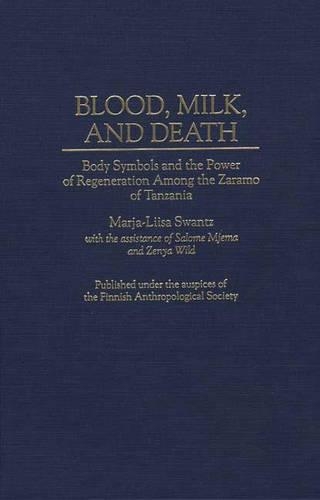
Blood, Milk, and Death: Body Symbols and the Power of Regeneration Among the Zaramo of Tanzania
(Hardback)
Publishing Details
Blood, Milk, and Death: Body Symbols and the Power of Regeneration Among the Zaramo of Tanzania
By (Author) Marja L. Swantz
Bloomsbury Publishing PLC
Praeger Publishers Inc
23rd March 1995
United States
Classifications
Tertiary Education
Non Fiction
Sociology: family, kinship and relationships
Cultural studies
Gender studies, gender groups
306.899678
Physical Properties
Hardback
168
Description
Beginning with the myth of origin that joins every young Zaramo woman to her origins as she is initiated into the secrets of life and womanhood, the book then provides us with an historical account of the Tanzanian coast around Dar es Salaam as a background to the persistence of the cultural institutions to which the reader is introduced. Statements and narrations by Salome as a representative of the modern educated Zaramo people intersperse the author's descriptions of the rituals of womanhood, of individual and social healing, and of the ways conflict is symbolically manipulated and managed. Rituals are seen in their vibrant role, not as remnants of tradition, but as means of handling encroaching external pressures on the community. These pressures include, commercialization of livelihood, development thrust in the form of villagization, or the ongoing process of losing land rights. The book shows that a people will counteract the threat of social disintegration by overemphasizing their core values in an attempt to create strong communication forces and instruments of power. A good introduction to contemporary African issues, Third World women's studies, and ethnographic anthropology.
Reviews
.,."the data are rich and the analysis sophisticated but lucid. This instructive work is essential for any anthropology and African studies library collection."-Choice
...the data are rich and the analysis sophisticated but lucid. This instructive work is essential for any anthropology and African studies library collection.-Choice
The important contributions of this book are its accessibilty and its use of primary texts. Swantz's discussion and analyses provide the undergraduate with direction and thought-provoking questions about the conduct of field research and the dynamic nature of rituals.-International Journal of African Historical Studies
..."the data are rich and the analysis sophisticated but lucid. This instructive work is essential for any anthropology and African studies library collection."-Choice
"The important contributions of this book are its accessibilty and its use of primary texts. Swantz's discussion and analyses provide the undergraduate with direction and thought-provoking questions about the conduct of field research and the dynamic nature of rituals."-International Journal of African Historical Studies
Author Bio
MARJA-LIISA SWANTZ is Professor and Docent in Social Anthropology at the University of Helsinki in Finland. She is Director Emeritus of the Institute of Development at the University of Helsinki and is affiliated to the United Nations University's World Institute for Development Economics Research (UNU- WIDER). She has lived and worked in Tanzania since 1963, and has published numerous works on the Zaramo with her husband, Rev. Dr. Lloyd Swantz.
